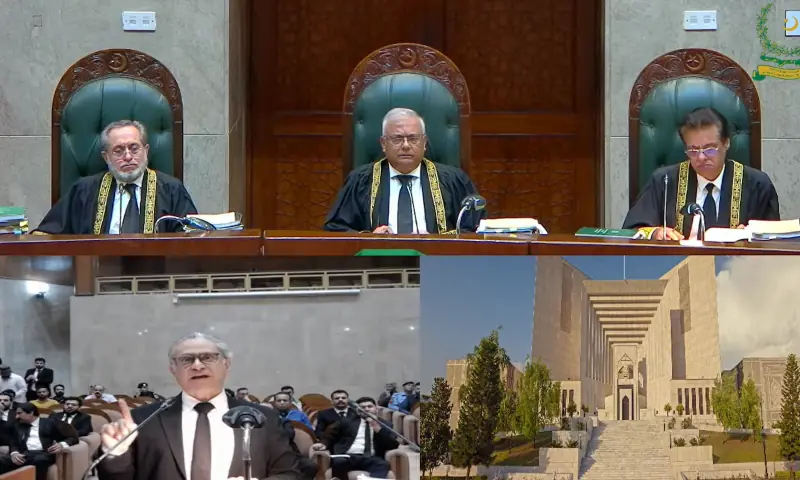The Supreme Court of Pakistan resumed hearing the petitions challenging the 26th Constitutional Amendment today, with intense debate over whether the case should be decided by a full court or a constitutional bench. The issue, though procedural, has stirred considerable legal and political discussion regarding the interpretation of constitutional powers and judicial independence.
Lawyer Ahmed Hussain, representing the petitioners, argued that the case should be heard by an independent bench rather than the current one, emphasizing that the institution’s credibility does not depend on the 26th Amendment alone. His stance prompted a series of sharp questions from the judges.
Justice Jamal Mandokhail asked whether the lawyer distrusted the current bench, remarking, “Are you not trusting the bench?” Justice Hassan Azhar Rizvi pointed out that there was no mention of a “full court” in the petition. Ahmed Hussain clarified that he was not questioning the bench’s independence but believed that a differently constituted bench should hear the case.
As the arguments continued, Justice Mandokhail pressed further, asking whether the proposed “independent bench” would include the Chief Justice. Hussain confirmed that the Chief Justice of Pakistan would indeed be part of it, to which Justice Aminuddin Khan reiterated the question, seeking clarity on the composition of such a bench.
Justice Mandokhail later raised a procedural concern: “If we cannot hear the case, how can we give an order?” highlighting the complexity of determining jurisdiction without proceeding with hearings.
Meanwhile, Advocate Khawaja Hussain Ahmed contended that newly appointed judges could still be included in the decision-making process but questioned why the court seemed reluctant to issue an order. He stressed that every lawyer has a different interpretation of the case, which has led to a wider debate in legal circles.
Justice Muhammad Ali Mazhar posed a key question: “Should this case be heard by a constitutional bench or a full court?” He noted that adding eight more judges would make the current bench a full court but not necessarily a constitutional bench, revealing the delicate distinction between both setups.
Justice Ayesha Malik asked the lawyer to read Article 191A, prompting a discussion on the powers and jurisdiction of the bench. Justice Mandokhail warned, “You should not abolish our jurisdiction,” reminding the counsel of the court’s authority under the Constitution.
The judges also questioned how bench formations had been handled historically, with Justice Mandokhail asking, “Since when has this procedure for forming a bench been in practice?” The discussion reflected broader concerns about judicial precedent and consistency.
Advocate Khawaja Hussain Ahmed argued that while a bench of 16 judges might technically be formed, it would still not qualify as a constitutional bench. He further stated that the federal government’s silence on the matter had added to the uncertainty.
Ahmed Hussain concluded by asserting that unless the constitutional requirements were fully met, the current bench could not legally continue hearing the case. “If the requirements of the constitutional amendment are not fulfilled, this bench cannot be formed either,” he maintained.
The Supreme Court’s hearing on the 26th Constitutional Amendment will resume tomorrow, with Advocate Shahid Jamil expected to present his arguments. As the debate deepens, the case could shape the future dynamics of Pakistan’s judiciary and its constitutional interpretation.

